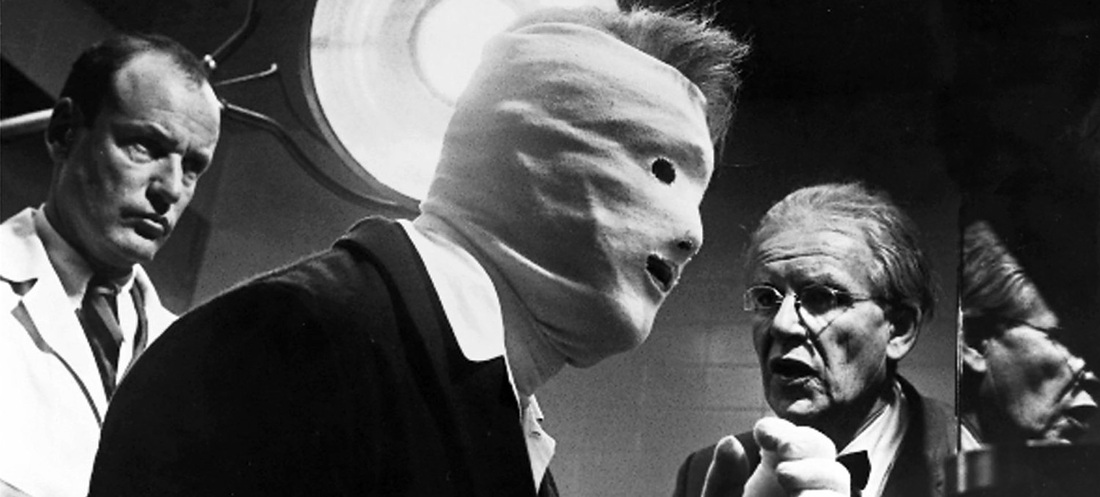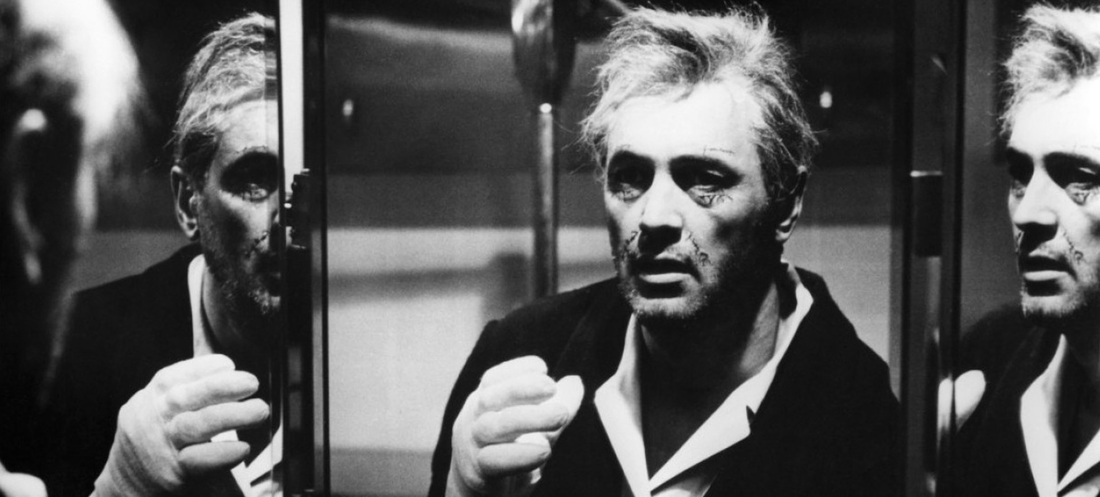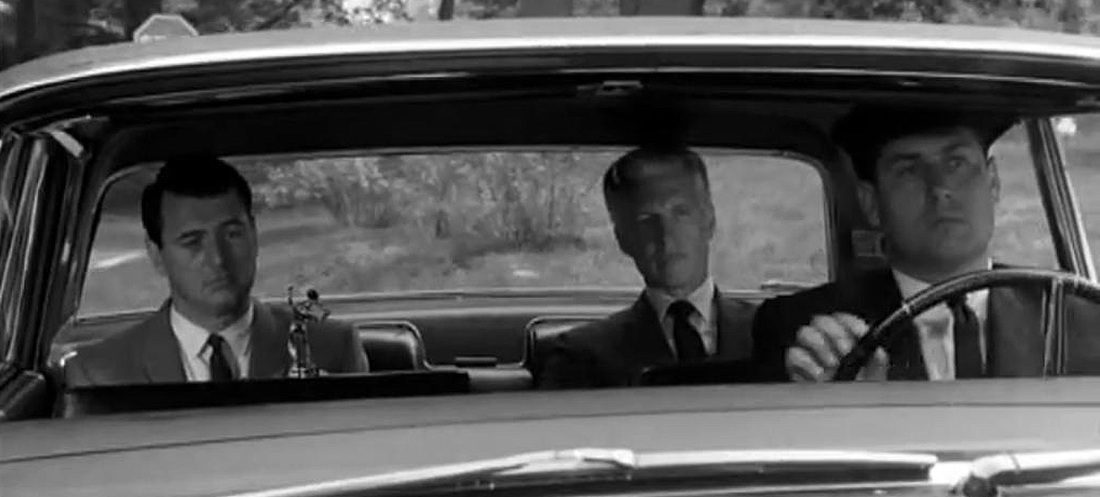SECONDS IS THE WEAKEST INSTALLMENT TO DIRECTOR JOHN FRANKENHEIMER'S 'PARANOIA' TRILOGY
As a fan of films, I’m often times forwarded requests of discs to spin in my DVD player from any number of folks. In case you’re wondering, I do research every suggestion I’m given. As do most of us when we’re given recommendations, I tend to weed out a great deal of them based on my own preferences, predilections, and desires. Plus time from a single lifetime just won’t permit me to rent, watch, and review every flick, short, or TV show, not even only the ones I’ve heard of … so it’s a constant battle of give and take.
However, as a fan of director John Frankenheimer, I’ve always been interested in viewing SECONDS. I recently picked up the solid release from the Criterion Collection, and I wanted to share a few thoughts with readers and like-minded souls.
Rest assured: you won’t get a ‘second’ chance.
(NOTE: The following review will contain minor spoilers necessary solely for the discussion of plot and/or characters. If you’re the type of reader who prefers a review entirely spoiler-free, then I’d encourage you to skip down to the last paragraphs for my final assessment. If, however, you’re accepting of a few modest hints at ‘things to come,’ then read on …)
From the product packaging: “Rock Hudson is a revelation in this sinister, science-fiction-inflected dispatch from the fractured 1960s. SECONDS, directed by John Frankenheimer, concerns a middle-aged banker who, dissatisfied with his suburban existence, elects to undergo a strange and elaborate procedure that will grant him a new life. Starting over in America, however, is not as easy as it sounds. This paranoiac symphony of canted camera angles (courtesy of famed cinematographer James Wong Howe), fragmented editing, and layered sound design is a remarkably risk-taking Hollywood film that ranks high on the list of its legendary director’s achievements.”
To be blunt, SECONDS is a science fiction film in much the same way that The Scooby-Doo Mysteries are horror shorts. This is to say that it really isn’t ‘legitimate’ so much as it generously pilfers elements of SciFi and heftily deposits them in the first third of the feature, much in the same way that crime-solving dog really only flirts with ghosts and demons in the story’s set-up. Once the masks come off in the finale, Scooby and the Gang always find a solution much closer to home than they ever do the paranormal or the afterlife.
Otherwise, what you’re experiencing with SECONDS compliments of director John Frankenheimer is largely more appropriately labeled a psychological drama steeped in helpings of Illuminati-induced disillusionment.
(I don’t say any of that as an insult. Instead I’m only hoping to clarify that those viewers coming to SECONDS with the belief that they’re about to witness the Second Coming of SciFi are apt to be as disappointed as the film’s character Wilson is with his predicament … both times! I’ve seen this film classified as Science Fiction in several respected volumes; it really isn’t, and that’s my perspective.)
But borrow heavily from SciFi it does!
However, as a fan of director John Frankenheimer, I’ve always been interested in viewing SECONDS. I recently picked up the solid release from the Criterion Collection, and I wanted to share a few thoughts with readers and like-minded souls.
Rest assured: you won’t get a ‘second’ chance.
(NOTE: The following review will contain minor spoilers necessary solely for the discussion of plot and/or characters. If you’re the type of reader who prefers a review entirely spoiler-free, then I’d encourage you to skip down to the last paragraphs for my final assessment. If, however, you’re accepting of a few modest hints at ‘things to come,’ then read on …)
From the product packaging: “Rock Hudson is a revelation in this sinister, science-fiction-inflected dispatch from the fractured 1960s. SECONDS, directed by John Frankenheimer, concerns a middle-aged banker who, dissatisfied with his suburban existence, elects to undergo a strange and elaborate procedure that will grant him a new life. Starting over in America, however, is not as easy as it sounds. This paranoiac symphony of canted camera angles (courtesy of famed cinematographer James Wong Howe), fragmented editing, and layered sound design is a remarkably risk-taking Hollywood film that ranks high on the list of its legendary director’s achievements.”
To be blunt, SECONDS is a science fiction film in much the same way that The Scooby-Doo Mysteries are horror shorts. This is to say that it really isn’t ‘legitimate’ so much as it generously pilfers elements of SciFi and heftily deposits them in the first third of the feature, much in the same way that crime-solving dog really only flirts with ghosts and demons in the story’s set-up. Once the masks come off in the finale, Scooby and the Gang always find a solution much closer to home than they ever do the paranormal or the afterlife.
Otherwise, what you’re experiencing with SECONDS compliments of director John Frankenheimer is largely more appropriately labeled a psychological drama steeped in helpings of Illuminati-induced disillusionment.
(I don’t say any of that as an insult. Instead I’m only hoping to clarify that those viewers coming to SECONDS with the belief that they’re about to witness the Second Coming of SciFi are apt to be as disappointed as the film’s character Wilson is with his predicament … both times! I’ve seen this film classified as Science Fiction in several respected volumes; it really isn’t, and that’s my perspective.)
But borrow heavily from SciFi it does!
SECONDS has secret societies. It has new age mysticism. There’s an almost Orwellian undercurrent to the entire motion picture. It posits cutting-edge science and psychology. Heck, one could argue it even involves themes as classic in art and literature as Mary Shelley’s Frankenstein because the story as constructed examines life ‘resurrected’ via technology much like the Monster enjoys his rejuvenation compliments of Victor Frankenstein. Hudson’s character Wilson even suffers a cruel, cruel fate at the hands of villagers (masquerading as doctors) when they show up in the conclusion to do what they feel is necessary to protect their secrets and lies in the only way they know best.
What else there is in SECONDS is yet another up-close-and-personal look by Frankenheimer to one of his most affecting themes: identity.
No secret to paranoid thrillers, the man had already explored much of this subject matter in two far-more-efficient pictures: THE MANCHURIAN CANDIDATE (1962) and SEVEN DAYS IN MAY (1964). Clearly, MANCHURIAN (loss of personal identity) is the director’s best picture (in my humble opinion); and – on this subject matter – even SEVEN DAYS (loss of institutional identity) clocks in vastly stronger than SECONDS. Precisely because this storyteller had quite probably said cinematically all that one need to say about paranoia, SECONDS ends up feeling more like ‘thirds,’ an interesting quandary given the fact so many scholars have christened the film the third installment in what’s often called his ‘paranoia trilogy.’ (Who knows? Perhaps it’s best that Frankenheimer moved on.)
As a consequence, there isn’t all that much fresh, vibrant, and original to SECONDS. To make matters marginally worse, the film’s second act is bloated and lethargic. It’s even more so when compared to its bookended pieces, weighing down an already necessarily protracted first act and slowing the pace for the vastly more engaging final act which pits Wilson against ‘his makers’ with an almost Hitchcockian flourish. If you’re watching closely, then you know it isn’t all going to end well, but at this juncture you can’t look away. Wilson is now ready for his second chance – having spoiled the one he already bought and paid for – but what awaits him only reminds us that second chances rarely if ever come along that often.
At times, Rock Hudson feels more aloof and detached than need be. He carries the picture, but his Wilson doesn’t appear to the end of the film’s first act (an emotionally distant John Randolph introduces the role, and a healthy bout of reconstructive plastic surgery turns him into Hudson). Once reinserted into ‘civil society,’ he spends many days trying to emotionally sort through what’s happened – Why was he given this second chance? What does it mean personally? What has he left behind? When he makes the acquaintance of a listless young woman sitting on the beach (Nora Marcus as played by a young Salome Jens of Star Trek: Deep Space Nine fame), Wilson begins to take baby steps toward actively engaging in this life, this new body, this new feeling … and therein SECONDS slows to a very weird crawl from his performance.
Also, this second act is punctuated by long, Bohemian detail – Wilson and Marcus explore the very strange counter culture lifestyle of some Malibu-based wine ‘cult’; back at home, Wilson takes to heavy drinking at a cocktail party of his own design; etc. As second acts do, this one pulls back the fabric, examining lives at a crossroads by upping the ante on the risk and intrigue. Eventually, Wilson discovers that not only has he been given a second chance but also virtually everyone around him in his new existence has as well! And they’re none too pleased with how he’s living it! Longing for what he’s left behind, Wilson makes an unapproved trip back home for a visit to his wife (Francis Reid); she’s been led to believe her husband died in a hotel fire, and Wilson is at least smart enough to let those sleeping dogs lie.
What else there is in SECONDS is yet another up-close-and-personal look by Frankenheimer to one of his most affecting themes: identity.
No secret to paranoid thrillers, the man had already explored much of this subject matter in two far-more-efficient pictures: THE MANCHURIAN CANDIDATE (1962) and SEVEN DAYS IN MAY (1964). Clearly, MANCHURIAN (loss of personal identity) is the director’s best picture (in my humble opinion); and – on this subject matter – even SEVEN DAYS (loss of institutional identity) clocks in vastly stronger than SECONDS. Precisely because this storyteller had quite probably said cinematically all that one need to say about paranoia, SECONDS ends up feeling more like ‘thirds,’ an interesting quandary given the fact so many scholars have christened the film the third installment in what’s often called his ‘paranoia trilogy.’ (Who knows? Perhaps it’s best that Frankenheimer moved on.)
As a consequence, there isn’t all that much fresh, vibrant, and original to SECONDS. To make matters marginally worse, the film’s second act is bloated and lethargic. It’s even more so when compared to its bookended pieces, weighing down an already necessarily protracted first act and slowing the pace for the vastly more engaging final act which pits Wilson against ‘his makers’ with an almost Hitchcockian flourish. If you’re watching closely, then you know it isn’t all going to end well, but at this juncture you can’t look away. Wilson is now ready for his second chance – having spoiled the one he already bought and paid for – but what awaits him only reminds us that second chances rarely if ever come along that often.
At times, Rock Hudson feels more aloof and detached than need be. He carries the picture, but his Wilson doesn’t appear to the end of the film’s first act (an emotionally distant John Randolph introduces the role, and a healthy bout of reconstructive plastic surgery turns him into Hudson). Once reinserted into ‘civil society,’ he spends many days trying to emotionally sort through what’s happened – Why was he given this second chance? What does it mean personally? What has he left behind? When he makes the acquaintance of a listless young woman sitting on the beach (Nora Marcus as played by a young Salome Jens of Star Trek: Deep Space Nine fame), Wilson begins to take baby steps toward actively engaging in this life, this new body, this new feeling … and therein SECONDS slows to a very weird crawl from his performance.
Also, this second act is punctuated by long, Bohemian detail – Wilson and Marcus explore the very strange counter culture lifestyle of some Malibu-based wine ‘cult’; back at home, Wilson takes to heavy drinking at a cocktail party of his own design; etc. As second acts do, this one pulls back the fabric, examining lives at a crossroads by upping the ante on the risk and intrigue. Eventually, Wilson discovers that not only has he been given a second chance but also virtually everyone around him in his new existence has as well! And they’re none too pleased with how he’s living it! Longing for what he’s left behind, Wilson makes an unapproved trip back home for a visit to his wife (Francis Reid); she’s been led to believe her husband died in a hotel fire, and Wilson is at least smart enough to let those sleeping dogs lie.
Inevitably, Wilson comes to see how badly he’s personally botched up this new life. Returning to the company (is it known as ReBirth?), he demands to be given yet another second chance, this time one entirely of his own design. Much like in life, this is when the banker-turned-artist learns life’s most valuable lessons far too late to alter what Fate has in store for him, and now Hudson turns in a terrific set of scenes – one after another – as Frankenheimer pulls back the final curtain with fabled cinematic cunning. It’s a dire end reached only because of dire circumstance.
I suspect there’s plenty more that could be said about SECONDS. It’s pretty clear that Frankenheimer was indicting a largely American way of life here. Wilson is painted as a bit of a loon in the set-up; he’s achieved basically everything he’s set out to do in his career, and yet he lives a life barren of hope. Even when his wife tries to seduce him with her feminine wiles, he’s mostly unresponsive. There are similar swipes at the American dream, capitalism, commercialism, and much more. For example, the Company would have you ‘buy’ a product – that being your promoted ‘second chance’ – but it does so only after preparing some means to extort the consumer should he (or she) attempt to decline the purchase last minute. Free choice doesn’t exist in Frankenheimer’s world. It never does. It’s the ultimate canard, but – when it does flirt with reality – it usually ends up pointing one on path toward the gallows.
HIGHLY RECOMMENDED.
So long as you’re prepared for more psychology than you can shake a stick at, SECONDS is a nice diversion. It isn’t nearly as resourceful as other films from director Frankenheimer, but keeping in perspective he made this at what may’ve been a creative peak for the storyteller certainly helps keep the slow parts in perspective. Also, Star Trek fans should keep an eye out for the lovely (and shirtless!) Salome Jens; interesting that she would appear much later in her career as the presumed head of the Founders, a near-mythical society of shapeshifters that used paranoia in much the same way the director does here.
I suspect there’s plenty more that could be said about SECONDS. It’s pretty clear that Frankenheimer was indicting a largely American way of life here. Wilson is painted as a bit of a loon in the set-up; he’s achieved basically everything he’s set out to do in his career, and yet he lives a life barren of hope. Even when his wife tries to seduce him with her feminine wiles, he’s mostly unresponsive. There are similar swipes at the American dream, capitalism, commercialism, and much more. For example, the Company would have you ‘buy’ a product – that being your promoted ‘second chance’ – but it does so only after preparing some means to extort the consumer should he (or she) attempt to decline the purchase last minute. Free choice doesn’t exist in Frankenheimer’s world. It never does. It’s the ultimate canard, but – when it does flirt with reality – it usually ends up pointing one on path toward the gallows.
HIGHLY RECOMMENDED.
So long as you’re prepared for more psychology than you can shake a stick at, SECONDS is a nice diversion. It isn’t nearly as resourceful as other films from director Frankenheimer, but keeping in perspective he made this at what may’ve been a creative peak for the storyteller certainly helps keep the slow parts in perspective. Also, Star Trek fans should keep an eye out for the lovely (and shirtless!) Salome Jens; interesting that she would appear much later in her career as the presumed head of the Founders, a near-mythical society of shapeshifters that used paranoia in much the same way the director does here.



